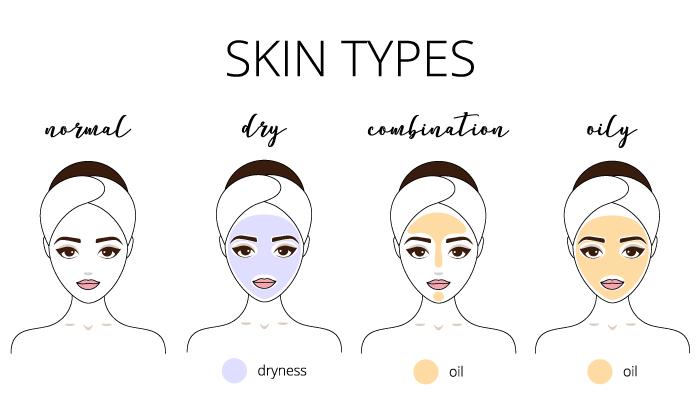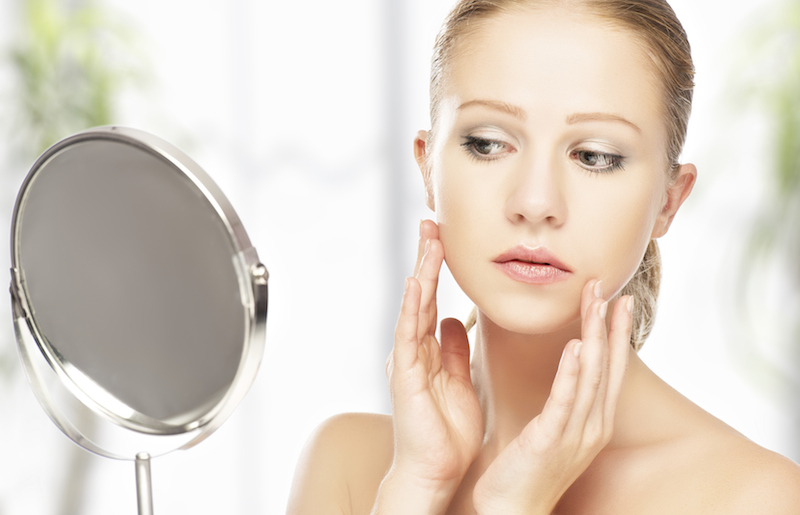Did you know that every skin type reacts differently to each ingredient? Commercial products made for the entire population may not really be the best bet for your skin! That’s why knowing your unique skin type is essential for your skincare. However, with an overwhelming amount of information available, figuring out how to care for your skin can be complicated.
Although everyone’s skin is unique, there are five basic skin types that most people fall into. Of course, our skin is complicated and will not always fit precisely into a single category. Of course, our skin can be cumbersome and can’t always be categorized in a specific way. Many factors can influence and change our skin type. However, the guide below will help you get a better idea of your skin’s general behavior and help you choose the best products and methods to care for it. Read the descriptions below and find out which type sounds most like your facial skin!
#1. Notice How Your Skin Feels
Noting how your skin feels every day of the week is essential. Your skin’s texture can reveal a lot about its essential nature.
- Normal Skin: Normal skin feels even and balanced. It’s neither too dry nor too oily or sensitive.
- Dry Skin: Dry skin will feel tight and dry. It’s normal for it to be flaky and crack, especially in the winter months.
- Combination Skin: Usually oily in the T-zone (the area that includes your nose, forehead, and chin), but dry everywhere else. It can also be oily and dry in different places, but if you notice two or more different textures on your face, it’s a sign that you have combination skin.
- Oily Skin: Oily skin is oily and shiny all over. If it feels like you have your hands on blotter sheets all the time, it means you probably have oily skin.
- Sensitive Skin: Sensitive skin usually feels itchy, patchy, dry, and can sometimes sting.
#2. Examine Your Pores
Your pores are also important indicators of your skin type. Their size and tendency to become clogged can tell you a lot about your skin and its oil production. But how do you determine your skin type?
- Normal Skin: People with normal skin usually have unnoticeable pores.
- Dry Skin: People with dry skin usually have small pores that often feel tight.
- Combination Skin: If pores are large and often clogged around the nose but are small and unnoticeable on the cheeks and other areas of the face, this is a sign of combination skin.
- Oily Skin: People with oily skin often have large pores that are easily clogged with sweat and oils that the body secretes.
- Sensitive Skin: People with sensitive skin often have normal to large pores, but this may vary depending on whether they have reacted to a product or other irritants.
#3. Notice How Your Skin Feels After Cleansing
- Normal Skin: People with normal skin will feel clean and clear after cleansing. They may still need a little moisturizer, but overall, the skin is not too dehydrated or sensitive.
- Combination Skin: After cleansing, combination skin is often clean, refreshed, and non-greasy on the nose, but taut and dry on the cheeks.
- Dry Skin: For dry skin, cleansing can dry out the skin and make it feel tight and dehydrated.
- Oily Skin: After cleansing, oily skin will feel clean and oil-free, almost the only time it feels that way. Shortly after cleansing, the oil will return.
- Sensitive Skin: Sensitive skin often feels clean and slightly dry after washing, but the cleanser may cause itching and irritation. When this happens frequently, and with a wide range of products, it is a sign of sensitive skin.
#4. Consider How Often You Need Moisturizer
While nearly everyone needs a moisturizer to keep their skin healthy and hydrated, the frequency with which you need it can indicate how well your skin can stay hydrated on its own and what type of skin you’re dealing with.
- Normal Skin: People with normal skin won’t need to apply moisturizer very often throughout the day as the skin stays fairly moisturized on its own.
- Combination Skin: Those with combination skin will frequently need to apply moisturizer to certain areas of their face that dry out (often the cheeks), but will rarely need it on other more oily regions (such as the T-zone).
- Dry Skin: Dry skin requires plenty of moisture throughout the day, and is especially in need of it when waking up or after facial cleansing.
- Oily Skin: For those with oily skin, moisturizer tends to make their skin even more oily, so they don’t need it very often during the day.
- Sensitive Skin: Sensitive skin usually needs a moisturizer fairly frequently; however, finding one that doesn’t irritate your skin or cause a reaction can be a real struggle.
So, which skin type sounds most like yours? Which category best fits your experience? Perhaps you need some professional advice from skilled therapists! Get in touch with the skin experts at MelSkin! Backed with years of expertise, they offer affordable, personalised and unrivalled beauty treatment.



